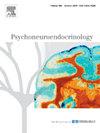急性应激和外源性催产素对不公平条件下男性决策的协同效应
IF 3.6
2区 医学
Q2 ENDOCRINOLOGY & METABOLISM
引用次数: 0
摘要
催产素(OXT)在应激诱导的依恋行为中起着关键作用,对社会经济决策具有重要意义。在本研究中,95名健康的年轻男性被随机分为四组,在进行特里尔社会压力测试(TSST)或对照程序之前,接受32 IU外源性OXT或安慰剂(PBO),然后作为应答者参加最后通牒游戏(UG),分配50日元。结果表明,氧化应激可抑制下丘脑-垂体-肾上腺(HPA)轴应激反应,增强交感神经系统活性,增加主观感知应激。压力和OXT协同作用,降低了男性对极不公平分配的接受度(5分),放大了之前的出价对期望的影响,突出了压力暴露和OXT治疗后社会线索的显著性。跨项目分析比较了一项同质研究中OXT和pbo治疗的男性和未治疗的女性。与女性相比,男性更倾向于拒绝中等不公平分配(¥20,¥15,¥10),表现出更高的劣势不平等厌恶。这些发现揭示了在不公平背景下,OXT和急性社会心理压力对男性决策和心理过程的综合影响,突出了社会行为的生物、心理和社会维度。本文章由计算机程序翻译,如有差异,请以英文原文为准。
The synergistic effects of acute stress and exogenous oxytocin on males’ decision-making under unfairness
Oxytocin (OXT) plays a critical role in stress-induced affiliative behavior, with important implications for socio-economic decision-making. In this study, 95 healthy young males were randomly assigned to four groups, receiving either 32 IU of exogenous OXT or a placebo (PBO) before undergoing the Trier Social Stress Test (TSST) or a control procedure, followed by participation in the Ultimatum Game (UG) as responders, allocating ¥50. The results indicated that OXT inhibited the hypothalamic-pituitary-adrenal (HPA) axis stress response, enhanced sympathetic nervous system activity, and increased subjectively perceived stress. Stress and OXT acted synergistically, reducing males’ acceptance of extremely unfair allocations (¥5) and amplifying the impact of previous offers on expectations, highlighting the salience of social cues after stress exposure and OXT treatment. Cross-project analyses compared OXT- and PBO-treated males with untreated females from a homogeneous study. Males rejected more moderately unfair allocations (¥20, ¥15, ¥10) and exhibited higher disadvantage inequality aversion than females, regardless of OXT treatment. These findings reveal the combined influence of OXT and acute psychosocial stress on males’ decision-making and psychological processes in unfairness contexts, highlighting the biological, psychological, and social dimensions of social behavior.
求助全文
通过发布文献求助,成功后即可免费获取论文全文。
去求助
来源期刊

Psychoneuroendocrinology
医学-精神病学
CiteScore
7.40
自引率
8.10%
发文量
268
审稿时长
66 days
期刊介绍:
Psychoneuroendocrinology publishes papers dealing with the interrelated disciplines of psychology, neurobiology, endocrinology, immunology, neurology, and psychiatry, with an emphasis on multidisciplinary studies aiming at integrating these disciplines in terms of either basic research or clinical implications. One of the main goals is to understand how a variety of psychobiological factors interact in the expression of the stress response as it relates to the development and/or maintenance of neuropsychiatric illnesses.
 求助内容:
求助内容: 应助结果提醒方式:
应助结果提醒方式:


